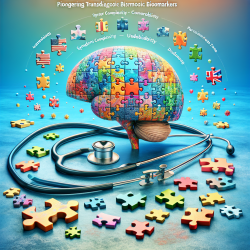The world of mental health treatment is on the cusp of a significant transformation. As practitioners grapple with the complexities of mental health disorders like depression, anxiety, and PTSD, a new approach is emerging that promises to revolutionize how these conditions are diagnosed and treated. This approach centers around transdiagnostic biomarkers—biological indicators that transcend traditional diagnostic categories to provide a more nuanced understanding of mental health disorders.
The Challenge of Symptom Complexity and Comorbidity
Mental health disorders are notoriously complex, with symptoms that often overlap across different diagnoses. For instance, depression is not a one-size-fits-all condition; it presents with a wide array of symptoms that can vary significantly from one individual to another. Moreover, comorbidity is common; many individuals with major depressive disorder (MDD) also experience anxiety or PTSD. This complexity makes it challenging to identify effective treatments using traditional diagnostic methods.
The Promise of Transdiagnostic Biomarkers
Transdiagnostic biomarker research aims to address these challenges by focusing on shared symptoms across disorders rather than rigid diagnostic categories. By identifying biomarkers linked to specific symptom profiles—such as anxiety, depression, and anhedonia—researchers hope to develop more personalized treatment strategies. These biomarkers include neuroendocrine markers like cortisol and inflammatory markers such as cytokines, which have been shown to vary across different mental health conditions.
Implementing Research Findings in Practice
For practitioners, integrating transdiagnostic biomarker research into clinical practice involves several steps:
- Understanding Biomarker Profiles: Familiarize yourself with the latest research on biomarkers associated with various mental health symptoms. This knowledge can guide you in identifying potential treatment pathways for your patients.
- Personalized Treatment Plans: Use biomarker data to tailor treatment plans that address the specific symptom profiles of your patients. This approach can enhance treatment efficacy and improve patient outcomes.
- Collaborative Research: Engage in collaborative research efforts to further explore the potential of transdiagnostic biomarkers. By contributing to this growing body of knowledge, you can help advance the field and improve care for individuals with complex mental health needs.
The Future of Precision Medicine in Psychiatry
The ultimate goal of transdiagnostic biomarker research is to move toward precision medicine in psychiatry—a model that considers the unique biological, psychological, and social factors affecting each individual. By embracing this comprehensive approach, practitioners can offer more effective and personalized care.
To read the original research paper that inspired this discussion, please follow this link: Transdiagnostic biomarker approaches to mental health disorders: Consideration of symptom complexity, comorbidity and context.










